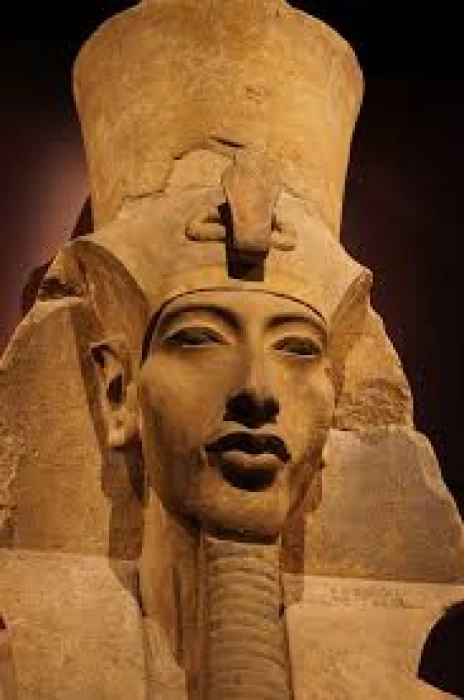
re Akhenaton | Amenhotep IV | Monoteismo nell'antico Egitto
re Akhenaton
Il faraone Akhenaton, che governò il Nuovo Regno d'Egitto durante la XVIII dinastia, regnò dal 1353 al 1336 a.C.. Gli altri suoi nomi, che si traducono tutti in "di successo per" o "di grande utilità per" il dio Aten, sono "Akhnaton", "Akhenaton", "Ecnaton" o "Ijnaton".
Questo è, di conseguenza, un tentativo di stabilire una religione monoteista, le tombe di Amarna furono particolarmente spostate sulla riva orientale del Nilo ma rivolte a ovest.
il tentativo di Akhenaton finì presto. Dopo la sua morte, salì al trono il giovane Tutankhamon che riaprì i templi di Amon per il culto, portò la capitale a Tebe e cambiò il suo nome in Tutankhamon al posto del nome dato da suo padre Akhenaton che era Tutankhaten.
Akhenaton, il primo monoteista conosciuto, avviò una significativa rivoluzione teologica, politica e religiosa che durò 17 anni e che ebbe un impatto sulla storia durante tutto il suo regno.
Amenhotep IV
Amenhotep IV (1372-1354 a.C.), figlio di Amenhotep III e marito di Nefertiti. Akhenaton è una figura unica nella storia egiziana, pose fine al millenario ordine religioso introducendo il monoteismo. Sovrano della XVIII dinastia del Nuovo Regno, assunse il nome del dio Aton, cioè il dio Sole, con il quale si identificò.
Monoteismo nell'antico Egitto
Dopo aver forzato il culto di questa divinità, il faraone spostò la capitale da Tebe ad Akhetaten, l'attuale città di Tell El-Amarna a El Menya, che divenne il centro del nuovo culto e combatté contro i potenti sacerdoti che cercavano di mantenere in vita il culto del dio Amon.
Tuttavia, il fiorire di questa nuova cultura terminò con la morte del re Akhenaton. Tutankhamon, salito al trono pochi anni dopo la morte di Akhenaton, riportò la capitale a Tebe e restaurò nuovamente il culto di Amon.
Il gruppo di statue della sua famiglia esposto all'interno del Museo Egizio del Cairo è il più grande esempio di come l'arte nell'antico Egitto fosse stata totalmente cambiata durante il periodo di Amarna.
Cairo Top Tours offre un'ampia gamma di viaggi che vi permettono di esplorare i siti e i luoghi storici da non perdere in Egitto. Le nostre guide esperte vi accompagneranno per tutta la durata del viaggio, fornendovi le spiegazioni dettagliate di tutti i siti che visiterete. Per saperne di più sui nostri tour, visitate il nostro sito web. Offriamo viaggi di un giorno e tour più lunghi, tutti comprensivi di servizi convenienti per garantire un viaggio senza problemi.
Pharaoh Akhenaten, who ruled the New Kingdom of Egypt during the 18th Dynasty, ruled from 1353 to 1336 BCE. His other names, which all translate to "successful for" or "of great use to" the god Aten, are "Akhnaton," "Akhenatenaton," "Ecnaton," or "Ijnaton."
The Akhenaten attempt ended early. After his death, he ascended to the throne as the young Tutankhamen, who reopened the temples of Amun for worship, brought the capital to Thebes, and changed his name to Tutankhamen instead of the name given by his father, Akhenaten, which was Tutankhaten.
Akhenaten, the first known monotheist, initiated a significant theological, political, and religious revolution lasting 17 years, impacting history throughout his reign.
Of all his reforms, perhaps the most marked was that of elevating Aten, the sun disk, into the place of chief deity. In the first years of his reign, he gradually brought about the transition away from traditional polytheism, which honored the gods Amun, Osiris, and Ra, toward the exclusive worship of Aten. In the fifth year of rule, he reconfirmed his name, adding to it a new one: Akhenaten, which means "Effective for Aten," in honor of his new deity.
Also, Akhenaten changed the capital city from Thebes to a new city he made called Akhetaten (the modern-day Amarna). This city was built with the intention that it would be the center of worship of Aten and the administrative point for the whole of Egypt. This act was the most audacious he did because it was a total cut-off from the very many centuries-old influence of the powerful priestly office of Amun over society in general.


















